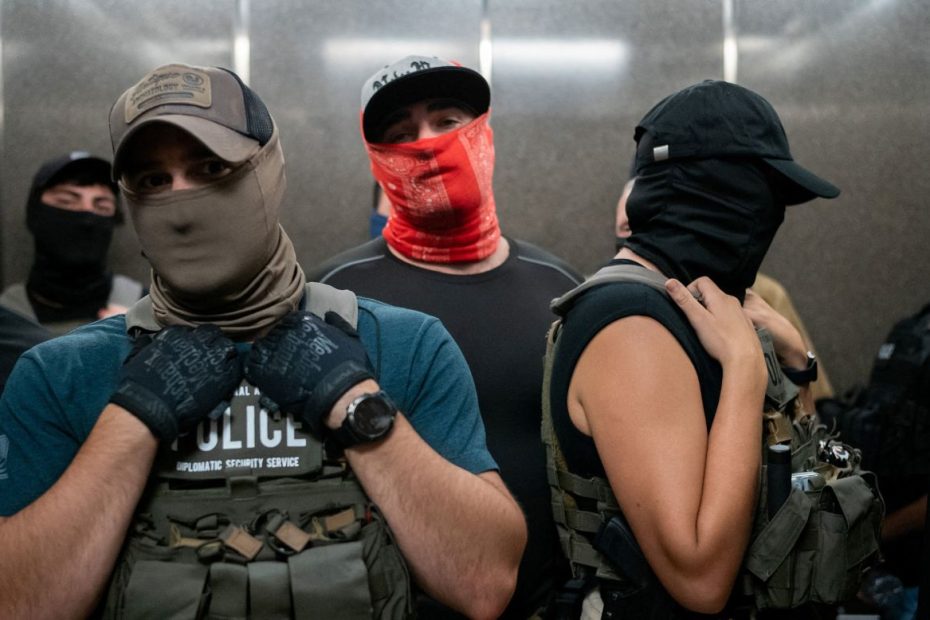A Black Hawk helicopter circles low over the rooftops. Ropes fall from their open door and agents rappel down towards the apartment building below. They crash through the windows, terrifying residents of the building. Charging through the apartment block, they zip-tie everyone they find. Black residents go to one side. Brown to another.
Meanwhile in a field office, other agents prepare for what they call “Freaky Friday,” when they will go out and round up children, ages 14-17. They will offer them money to leave the country immediately. If they refuse, their parents will be deported.
These are the latest actions of the Immigration and Customs Enforcement Agency or as it is colloquially known, ICE—a name that looms large over America’s political imagination. For the right, ICE is an agency dedicated to the project of restoring America’s greatness by deporting millions of undocumented criminals. For the center it is a misguided agency with some bad apples. For the left, it is an agent of authoritarianism and ethnic cleansing.
ICE agents have kidnapped, disappeared, and tortured immigrants. They have refused to identify themselves. They have stranded and abandoned children after deporting their parents. They have assaulted protestors. They have made false 911 calls to punish a police department that wouldn’t work with them. They hogtied a protestor and paraded him around on a gurney. They pepper sprayed officers of the Chicago Police Department.
Federal agents have immunity from prosecution if they do no more than what is necessary and proper as part of their “official duties,” but it is clear that what many ICE agents are doing goes well and beyond any supposed official duties. ICE agents are not and should not be above the law: the time has come to prosecute ICE.
Prosecuting ICE agents is not a particularly radical proposal. New York City Comptroller Brad Lander, a progressive, and Congressman Dan Goldman, a relative moderate, called for an ICE agent who brutalized a protester to be prosecuted, and Democrats in the House and Senate have announced plans to investigate ICE agents. Even Nancy Pelosi agrees. As ICE agents continue to engage in egregious acts, the pressure for officials to take action will continue to grow.
We can’t expect Trump’s Department of Justice to prosecute ICE agents, so we will have to rely on state and county level prosecutions. Since federal agents may have immunity, prosecuting ICE agents on the state level is legally tricky, but doable. Courts have ruled that a state can prosecute federal agents if they violate a state law in a way that goes beyond what is necessary and proper in carrying out their official duties. In 1906, two soldiers shot a man who witnesses say had surrendered. The Supreme Court ruled that the state criminal case against them could proceed because it was up to the state court to decide whether the shooting was carried out in the performance of a duty imposed by federal law.
This means that in order to prosecute ICE agents, state and county prosecutors will have to identify specific actions that violate state laws and cannot be reasonably said to be included in an ICE agent’s official duties. Governors, mayors, and other elected officials should call for the prosecution of ICE agents and state and district attorneys should begin prosecuting them. This is not only important for blue cities like Chicago and Los Angeles, which are being targeted by the Trump administration, but also for cities in red states with governors who may be more accommodating to ICE. Prosecuting ICE agents would be a stark reminder that the rule of law applies to everyone—presidents and ICE agents included. Furthermore, prosecuting ICE agents would necessarily slow their deportation operations, a moral necessity. This goes beyond immigration enforcement. The actions of this administration are a deliberate attempt to ethnically cleanse the country of brown immigrants.
So what would prosecuting ICE agents look like? First off, direct confrontations between local police and ICE agents would be a disaster. Given the political leanings of many police departments, some might refuse to do so, but more importantly, having two armed agencies face off against each other is a recipe for violence.
Instead district and state attorneys general should seek arrest warrants for ICE agents who break the law. If an ICE agent has an arrest warrant out for them, they will be unable to engage in normal life. Any traffic stop or other encounter with the police, even when they are off duty, could result in their arrest.
Issuing arrest warrants for ICE agents will require observers to track and document crimes from ICE agents, as well as work to uncover their identities since many refuse to publicly identify themselves. Observation and reporting could be done by professionalizing the already large groups of volunteer ICE watchers. New York Attorney General, Tish James developed something similar to this: an online portal where volunteers could submit footage of ICE agents, after a raid on street vendors in Manhattan. Even if individual agents can’t be identified, Field Directors can be prosecuted for issuing illegal orders.
Prosecution should be done nationwide and at scale. Right now, court battles against Trump’s draconian immigration policies are usually focused on singular cases, like Kilmar Garcia, but prosecuting ICE agents should be done by a nationwide coalition of district and state attorneys general holding ICE agents accountable. Inevitably many of these cases will get struck down by the court system, but some will be successful. At the very least such a large number of cases will seriously hamper ICE’s operations and resources.
They will also make recruiting much more difficult. ICE and Customs and Border Protection were given over $170 Billion in Trump’s recent budget, more than every single state and local police department in all 50 states combined. This means that an already lawless and authoritarian agency will balloon in size. Yet despite the lucrative pay and benefits it offers, ICE is having trouble recruiting. It will have even more trouble recruiting if becoming an ICE agent means that you will be tried for your crimes.
Kafkaesque has become a term used to describe any absurd situation, but Kafka’s actual work is about the horrors of authoritarian states. The true absurdity of The Trial is that K never knows if the group prosecuting him is an official government body or just random people. This blurring of the lines between state-sanctioned and arbitrary violence is a feature of authoritarian states that is incredibly dangerous. It allows ICE to brutalize and torture immigrants and citizens alike. It is truly Kafkaesque and it must be stopped immediately. There have already been several cases of private citizens attempting to impersonate ICE agents and kidnap immigrants. How many more of these horrors are happening under the radar?
Trump will retaliate against governments that prosecute ICE, but he will attack any Democratic state or local government anyway. There is no negotiating with authoritarianism. We can only fight back.
As he enters his second year in office, Trump’s approval rating has taken a nosedive, even on immigration, his once strongest issue. Meanwhile, his administration is fighting back against popular backlash to his immigration policies by attempting to portray ICE as victims of violence as opposed to the perpetrators they are. Prosecuting ICE agents is a tangible way of tangling up the machinery of Trump’s authoritarianism and building popular support against him. Most importantly, we have a moral duty to stand with undocumented and documented immigrants, the most vulnerable members of our society.


